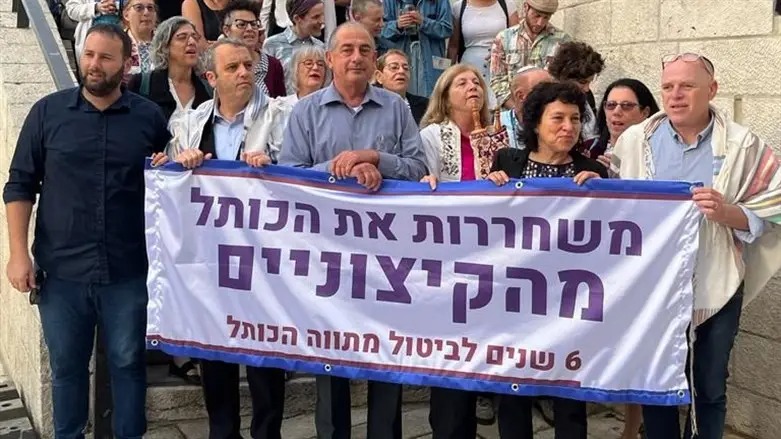 [By Rabbi Yair Hoffman]
[By Rabbi Yair Hoffman]
Two cars, a garage, and a home in the suburbs – this is generally known as the American dream.
But what is the American Jewish dream? Many would answer – two cars, a garage, a home in the suburbs, and another home in Eretz Yisroel.
Some of those who have fulfilled this American Jewish dream will often run into a halachic question: Sometimes they are in America, and their home in Israel needs a plumber, electrician, locksmith, etc. When this happens on erev yom tov, and the only time someone can come is on the second day of yom tov – can a Jew in Israel perform actions on behalf of an American Jew in America on the second day of yom tov?
This question, of course, assumes that when the American Jew happens to be in Israel, there is no question that he may not tell an Israeli Jew to perform work for him on the second day of yom tov. The Moharikash cited by the Birchei Yoseph actually permits it, but the Birchei Yoseph himself cites a number of authorities that vehemently disagree (see further Piskei Teshuvah by Rabbi Simcha Rabinowitz Vol. V p. 347). Most contemporary Poskim rule like the Birchei Yoseph.
TWO REASONS FOR PROHIBITION
The Hagaos Chochmas Shlomo (O.C. 496) provides two reasons for this prohibition:
A. It is no worse than the prohibition of telling a gentile to do work on yom tov.
B. There is a halachic concept known as shelichus—acting as someone’s agent—which would apply even more when utilizing Jewish people than when utilizing gentiles. Hence, our case is even more of a halachic problem than having a gentile do work for us.
In explanation of reason A, it is worth noting that there are three reasons cited by the Rishonim as to the prohibition of having a gentile do work for us – either on Shabbos or yom tov.
THREE EXPLANATIONS
The Rambam explains that the Sages forbade it because one may come to take Shabbos lightly.
Rashi gives two different explanations. In Maseches Avodah Zarah he writes that it is because of shelichus, that the Sages treated it as if this gentile was actually the sender performing the action.
In Maseches Shabbos, however, Rashi writes that it is because of the verse “v’daber davar”—that one’s very speech patterns on Shabbos (and yom tov) must be different than during the week. As a consequence, the Sages forbade us from discussing something that would be forbidden to be performed on Shabbos or yom tov.
L’halachah, we are stringent and rule like all three opinions.
AN AMERICAN JEWISH OWNER IN AMERICA
However, our case is discussing when the American Jew is not currently in Israel when the plumber, electrician, or locksmith is doing his work.
What is the halachah then?
The answer (for those who have not already guessed) is that it is a machlokes. Dayan Weiss, zt’l, seems to rule that it is forbidden (Minchas Yitzchok Vol. VII No. 34–36). Rav Moshe Feinstein zt’l, rules that it is permitted (Igros Moshe O.C. II, No. 99). Common practice, it seems, is in accordance with the opinion of Rabbi Feinstein, zt’l.
ISRAELI JEW IN ISRAEL
What about the other way around? What if someone in Israel has a business in America (or more commonly in China)? Can he open on the second day of yom tov?
The Sefer Yom Tov Sheini K’Hilchaso cites Rav Elyashiv, zatzal, who forbids it.
Lately, there have been a number of call centers that have opened in foreign countries. People that speak English as well as Americans are at a premium, and a number of kollel wives with mother-tongue level English have been employed in these call centers.
Can a Jew in Tel Aviv, where many of these call centers are located, call a gentile in the United States on the second day of yom tov? Or how about sending a fax that will arrive in the United States on the second day of yom tov? Rav Elyashiv ruled that it is permitted (See Sheivet HaKehasi II:177 and III:172 cited by Piskei Teshuvos Vol. V p. 349).
HINTING
There is a common error that is often made regarding gentiles and Shabbos or yom tov and that is the issue of hinting. Some people erroneously think that all is permitted if one merely hints to the gentile to do something, rather than tell him outright. This is not the case.
There are actually two prohibitions that our Sages instituted regarding gentiles and Shabbos or yom tov. The first prohibition is the fact that the Sages forbade us to request of the gentile to do something that we are forbidden to do. The second prohibition is that the Sages forbade us from benefiting from something that the gentile has done for us, even if we did not ask him to do it. Although hinting might circumvent the first prohibition, it would not help regarding the second prohibition.
One might then ask, of course, when hinting would ever help. The answer to that question is that hinting helps when the gentile is removing or taking something away rather than creating something. For example, if one were to hint to a gentile to shut off a light, there is nothing in existence there for the Sages to have forbidden its benefit. They never forbade benefiting from the absence of something.
Accordingly, if one were to have hinted to a gentile to turn on a light, the second prohibition would certainly be in effect. Hinting does work when one hints to a gentile to shut something off.
There are, of course, times, when it would be permitted to tell a gentile to do something on Shabbos and or yom tov, too. These cases are somewhat complicated and depend upon whether the issue involved is forbidden Biblically or rabbinically. Briefly, one may request a gentile to perform Biblical malachah (if necessary) during bein ha’shemashos (twilight), if it is halachically considered indirect (through a p’sik reishah), if it is for the needs of a sick person, to fix an eiruv, or if it is necessary for the performance of a b’ris.
There are a few more leniencies when the issue is only a rabbinic one. For example, if there would be a great financial loss, it would be permitted to ask a gentile to perform a rabbinic prohibition, but not a Biblical one.
Thus, returning to our case, even if the American Jew is in Israel, and there would be a huge financial loss, he may ask the Israeli locksmith, plumber, or electrician to perform the service only if it is a rabbinic prohibition, but not a Biblical one. Rav Moshe Feinstein would permit it entirely if the American owner was in the United States, while Dayan Weiss would not.
The author can be reached at [email protected]










